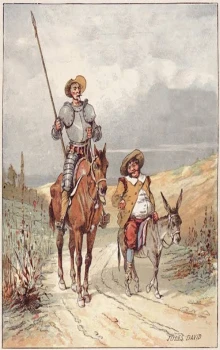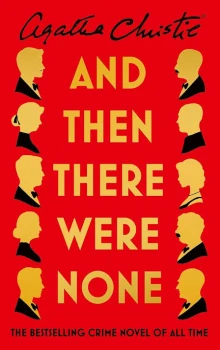-one,
Don Quixote raised his eyes and saw coming along the road he was follow-
ing some dozen men on foot strung together by the neck, like beads, on a
great iron chain, and all with manacles on their hands. With them there
came also two men on horseback and two on foot; those on horseback with
wheel-lock muskets, those on foot with javelins and swords, and as soon as
Sancho saw them he said:
"That is a chain of galley slaves, on the way to the galleys by force of the
king's orders."
"How by force?" asked Don Quixote; "is it possible that the king uses
force against anyone?"
"I do not say that," answered Sancho, "but that these are people con-
demned for their crimes to serve by force in the king's galleys."
"In fact," replied Don Quixote, "however it may be, these people are go-
ing where they are taking them by force, and not of their own will."
"Just so," said Sancho.
"Then if so," said Don Quixote, "here is a case for the exercise of my of-
fice, to put down force and to succour and help the wretched."
"Recollect, your worship," said Sancho, "Justice, which is the king him-
self, is not using force or doing wrong to such persons, but punishing them
for their crimes."
The chain of galley slaves had by this time come up, and Don Quixote in
very courteous language asked those who were in custody of it to be good
enough to tell him the reason or reasons for which they were conducting
these people in this manner. One of the guards on horseback answered that
they were galley slaves belonging to his majesty, that they were going to the
galleys, and that was all that was to be said and all he had any business to
know.
"Nevertheless," replied Don Quixote, "I should like to know from each of
them separately the reason of his misfortune;" to this he added more to the
same effect to induce them to tell him what he wanted so civilly that the
other mounted guard said to him:
"Though we have here the register and certificate of the sentence of every
one of these wretches, this is no time to take them out or read them; come
and ask themselves; they can tell if they choose, and they will, for these fel-
lows take a pleasure in doing and talking about rascalities."
With this permission, which Don Quixote would have taken even had
they not granted it, he approached the chain and asked the first for what of-
fences he was now in such a sorry case.
He made answer that it was for being a lover.
"For that only?" replied Don Quixote; "why, if for being lovers they send
people to the galleys I might have been rowing in them long ago."
"The love is not the sort your worship is thinking of," said the galley
slave; "mine was that I loved a washerwoman's basket of clean linen so
well, and held it so close in my embrace, that if the arm of the law had not
forced it from me, I should never have let it go of my own will to this mo-
ment; I was caught in the act, there was no occasion for torture, the case
was settled, they treated me to a hundred lashes on the back, and three years
of gurapas besides, and that was the end of it."
"What are gurapas?" asked Don Quixote.
"Gurapas are galleys," answered the galley slave, who was a young man
of about four-and-twenty, and said he was a native of Piedrahita.
Don Quixote asked the same question of the second, who made no reply,
so downcast and melancholy was he; but the first answered for him, and
said, "He, sir, goes as a canary, I mean as a musician and a singer."
"What!" said Don Quixote, "for being musicians and singers are people
sent to the galleys too?"
"Yes, sir," answered the galley slave, "for there is nothing worse than
singing under suffering."
"On the contrary, I have heard say," said Don Quixote, "that he who sings
scares away his woes."
"Here it is the reverse," said the galley slave; "for he who sings once
weeps all his life."
"I do not understand it," said Don Quixote; but one of the guards said to
him, "Sir, to sing under suffering means with the non sancta fraternity to
confess under torture; they put this sinner to the torture and he confessed his
crime, which was being a cuatrero, that is a cattle-stealer, and on his confes-
sion they sentenced him to six years in the galleys, besides two bundred
lashes that he has already had on the back; and he is always dejected and
downcast because the other thieves that were left behind and that march
here ill-treat, and snub, and jeer, and despise him for confessing and not
having spirit enough to say nay; for, say they, 'nay' has no more letters in it
than 'yea,' and a culprit is well off when life or death with him depends on
his own tongue and not on that of witnesses or evidence; and to my thinking
they are not very far out."
"And I think so too," answered Don Quixote; then passing on to the third
he asked him what he had asked the others, and the man answered very
readily and unconcernedly, "I am going for five years to their ladyships the
gurapas for the want of ten ducats."
"I will give twenty with pleasure to get you out of that trouble," said Don
Quixote.
"That," said the galley slave, "is like a man having money at sea when he
is dying of hunger and has no way of buying what he wants; I say so be-
cause if at the right time I had had those twenty ducats that your worship
now offers me, I would have greased the notary's pen and freshened up the
attorney's wit with them, so that to-day I should be in the middle of the
plaza of the Zocodover at Toledo, and not on this road coupled like a grey-
hound. But God is great; patience—there, that's enough of it."
Don Quixote passed on to the fourth, a man of venerable aspect with a
white beard falling below his breast, who on hearing himself asked the rea-
son of his being there began to weep without answering a word, but the fifth
acted as his tongue and said, "This worthy man is going to the galleys for
four years, after having gone the rounds in ceremony and on horseback."
"That means," said Sancho Panza, "as I take it, to have been exposed to
shame in public."
"Just so," replied the galley slave, "and the offence for which they gave
him that punishment was having been an ear-broker, nay body-broker; I
mean, in short, that this gentleman goes as a pimp, and for having besides a
certain touch of the sorcerer about him."
"If that touch had not been thrown in," said Don Quixote, "he would not
deserve, for mere pimping, to row in the galleys, but rather to command and
be admiral of them; for the office of pimp is no ordinary one, being the of-
fice of persons of discretion, one very necessary in a well-ordered state, and
only to be exercised by persons of good birth; nay, there ought to be an in-
spector and overseer of them, as in other offices, and recognised number, as
with the brokers on change; in this way many of the evils would be avoided
which are caused by this office and calling being in the hands of stupid and
ignorant people, such as women more or less silly, and pages and jesters of
little standing and experience, who on the most urgent occasions, and when
ingenuity of contrivance is needed, let the crumbs freeze on the way to their
mouths, and know not which is their right hand. I should like to go farther,
and give reasons to show that it is advisable to choose those who are to hold
so necessary an office in the state, but this is not the fit place for it; some
day I will expound the matter to some one able to see to and rectify it; all I
say now is, that the additional fact of his being a sorcerer has removed the
sorrow it gave me to see these white hairs and this venerable countenance in
so painful a position on account of his being a pimp; though I know well
there are no sorceries in the world that can move or compel the will as some
simple folk fancy, for our will is free, nor is there herb or charm that can
force it. All that certain silly women and quacks do is to turn men mad with
potions and poisons, pretending that they have power to cause love, for, as I
say, it is an impossibility to compel the will."
"It is true," said the good old man, "and indeed, sir, as far as the charge of
sorcery goes I was not guilty; as to that of being a pimp I cannot deny it; but
I never thought I was doing any harm by it, for my only object was that all
the world should enjoy itself and live in peace and quiet, without quarrels or
troubles; but my good intentions were unavailing to save me from going
where I never expect to come back from, with this weight of years upon me
and a urinary ailment that never gives me a moment's ease;" and again he
fell to weeping as before, and such compassion did Sancho feel for him that
he took out a real of four from his bosom and gave it to him in alms.
Don Quixote went on and asked another what his crime was, and the man
answered with no less but rather much more sprightliness than the last one.
"I am here because I carried the joke too far with a couple of cousins of
mine, and with a couple of other cousins who were none of mine; in short, I
carried the joke so far with them all that it ended in such a complicated in-
crease of kindred that no accountant could make it clear: it was all proved
against me, I got no favour, I had no money, I was near having my neck
stretched, they sentenced me to the galleys for six years, I accepted my fate,
it is the punishment of my fault; I am a young man; let life only last, and
with that all will come right. If you, sir, have anything wherewith to help
the poor, God will repay it to you in heaven, and we on earth will take care
in our petitions to him to pray for the life and health of your worship, that
they may be as long and as good as your amiable appearance deserves."
This one was in the dress of a student, and one of the guards said he was
a great talker and a very elegant Latin scholar.
Behind all these there came a man of thirty, a very personable fellow, ex-
cept that when he looked, his eyes turned in a little one towards the other.
He was bound differently from the rest, for he had to his leg a chain so long
that it was wound all round his body, and two rings on his neck, one at-
tached to the chain, the other to what they call a "keep-friend" or "friend's
foot," from which hung two irons reaching to his waist with two manacles
fixed to them in which his hands were secured by a big padlock, so that he
could neither raise his hands to his mouth nor lower his head to his hands.
Don Quixote asked why this man carried so many more chains than the oth-
ers. The guard replied that it was because he alone had committed more
crimes than all the rest put together, and was so daring and such a villain,
that though they marched him in that fashion they did not feel sure of him,
but were in dread of his making his escape.
"What crimes can he have committed," said Don Quixote, "if they have
not deserved a heavier punishment than being sent to the galleys?"
"He goes for ten years," replied the guard, "which is the same thing as
civil death, and all that need be said is that this good fellow is the famous
Gines de Pasamonte, otherwise called Ginesillo de Parapilla."
"Gently, senor commissary," said the galley slave at this, "let us have no
fixing of names or surnames; my name is Gines, not Ginesillo, and my fam-
ily name is Pasamonte, not Parapilla as you say; let each one mind his own
business, and he will be doing enough."
"Speak with less impertinence, master thief of extra measure," replied the
commissary, "if you don't want me to make you hold your tongue in spite of
your teeth."
"It is easy to see," returned the galley slave, "that man goes as God pleas-
es, but some one shall know some day whether I am called Ginesillo de
Parapilla or not."
"Don't they call you so, you liar?" said the guard.
"They do," returned Gines, "but I will make them give over calling me
so, or I will be shaved, where, I only say behind my teeth. If you, sir, have
anything to give us, give it to us at once, and God speed you, for you are
becoming tiresome with all this inquisitiveness about the lives of others; if
you want to know about mine, let me tell you I am Gines de Pasamonte,
whose life is written by these fingers."
"He says true," said the commissary, "for he has himself written his story
as grand as you please, and has left the book in the prison in pawn for two
hundred reals."
"And I mean to take it out of pawn," said Gines, "though it were in for
two hundred ducats."
"Is it so good?" said Don Quixote.
"So good is it," replied Gines, "that a fig for 'Lazarillo de Tormes,' and all
of that kind that have been written, or shall be written compared with it: all
I will say about it is that it deals with facts, and facts so neat and diverting
that no lies could match them."
"And how is the book entitled?" asked Don Quixote.
"The 'Life of Gines de Pasamonte,'" replied the subject of it.
"And is it finished?" asked Don Quixote.
"How can it be finished," said the other, "when my life is not yet fin-
ished? All that is written is from my birth down to the point when they sent
me to the galleys this last time."
"Then you have been there before?" said Don Quixote.
"In the service of God and the king I have been there for four years be-
fore now, and I know by this time what the biscuit and courbash are like,"
replied Gines; "and it is no great grievance to me to go back to them, for
there I shall have time to finish my book; I have still many things left to say,
and in the galleys of Spain there is more than enough leisure; though I do
not want much for what I have to write, for I have it by heart."
"You seem a clever fellow," said Don Quixote.
"And an unfortunate one," replied Gines, "for misfortune always perse-
cutes good wit."
"It persecutes rogues," said the commissary.
"I told you already to go gently, master commissary," said Pasamonte;
"their lordships yonder never gave you that staff to ill-treat us wretches
here, but to conduct and take us where his majesty orders you; if not, by the
life of-never mind-; it may be that some day the stains made in the inn will
come out in the scouring; let everyone hold his tongue and behave well and
speak better; and now let us march on, for we have had quite enough of this
entertainment."
The commissary lifted his staff to strike Pasamonte in return for his
threats, but Don Quixote came between them, and begged him not to ill-use
him, as it was not too much to allow one who had his hands tied to have his
tongue a trifle free; and turning to the whole chain of them he said:
"From all you have told me, dear brethren, make out clearly that though
they have punished you for your faults, the punishments you are about to
endure do not give you much pleasure, and that you go to them very much
against the grain and against your will, and that perhaps this one's want of
courage under torture, that one's want of money, the other's want of advoca-
cy, and lastly the perverted judgment of the judge may have been the cause
of your ruin and of your failure to obtain the justice you had on your side.
All which presents itself now to my mind, urging, persuading, and even
compelling me to demonstrate in your case the purpose for which Heaven
sent me into the world and caused me to make profession of the order of
chivalry to which I belong, and the vow I took therein to give aid to those in
need and under the oppression of the strong. But as I know that it is a mark
of prudence not to do by foul means what may be done by fair, I will ask
these gentlemen, the guards and commissary, to be so good as to release
you and let you go in peace, as there will be no lack of others to serve the
king under more favourable circumstances; for it seems to me a hard case to
make slaves of those whom God and nature have made free. Moreover, sirs
of the guard," added Don Quixote, "these poor fellows have done nothing to
you; let each answer for his own sins yonder; there is a God in Heaven who
will not forget to punish the wicked or reward the good; and it is not fitting
that honest men should be the instruments of punishment to others, they be-
ing therein no way concerned. This request I make thus gently and quietly,
that, if you comply with it, I may have reason for thanking you; and, if you
will not voluntarily, this lance and sword together with the might of my arm
shall compel you to comply with it by force."
"Nice nonsense!" said the commissary; "a fine piece of pleasantry he has
come out with at last! He wants us to let the king's prisoners go, as if we
had any authority to release them, or he to order us to do so! Go your way,
sir, and good luck to you; put that basin straight that you've got on your
head, and don't go looking for three feet on a cat."
"'Tis you that are the cat, rat, and rascal," replied Don Quixote, and acting
on the word he fell upon him so suddenly that without giving him time to
defend himself he brought him to the ground sorely wounded with a lance-
thrust; and lucky it was for him that it was the one that had the musket. The
other guards stood thunderstruck and amazed at this unexpected event, but
recovering presence of mind, those on horseback seized their swords, and
those on foot their javelins, and attacked Don Quixote, who was waiting for
them with great calmness; and no doubt it would have gone badly with him
if the galley slaves, seeing the chance before them of liberating themselves,
had not effected it by contriving to break the chain on which they were
strung. Such was the confusion, that the guards, now rushing at the galley
slaves who were breaking loose, now to attack Don Quixote who was wait-
ing for them, did nothing at all that was of any use. Sancho, on his part,
gave a helping hand to release Gines de Pasamonte, who was the first to
leap forth upon the plain free and unfettered, and who, attacking the pros-
trate commissary, took from him his sword and the musket, with which,
aiming at one and levelling at another, he, without ever discharging it, drove
every one of the guards off the field, for they took to flight, as well to es-
cape Pasamonte's musket, as the showers of stones the now released galley
slaves were raining upon them. Sancho was greatly grieved at the affair, be-
cause he anticipated that those who had fled would report the matter to the
Holy Brotherhood, who at the summons of the alarm-bell would at once sal-
ly forth in quest of the offenders; and he said so to his master, and entreated
him to leave the place at once, and go into hiding in the sierra that was close
by.
"That is all very well," said Don Quixote, "but I know what must be done
now;" and calling together all the galley slaves, who were now running riot,
and had stripped the commissary to the skin, he collected them round him
to hear what he had to say, and addressed them as follows: "To be grateful
for benefits received is the part of persons of good birth, and one of the sins
most offensive to God is ingratitude; I say so because, sirs, ye have already
seen by manifest proof the benefit ye have received of me; in return for
which I desire, and it is my good pleasure that, laden with that chain which
I have taken off your necks, ye at once set out and proceed to the city of El
Toboso, and there present yourselves before the lady Dulcinea del Toboso,
and say to her that her knight, he of the Rueful Countenance, sends to com-
mend himself to her; and that ye recount to her in full detail all the particu-
lars of this notable adventure, up to the recovery of your longed-for liberty;
and this done ye may go where ye will, and good fortune attend you."
Gines de Pasamonte made answer for all, saying, "That which you, sir,
our deliverer, demand of us, is of all impossibilities the most impossible to
comply with, because we cannot go together along the roads, but only
singly and separate, and each one his own way, endeavouring to hide our-
selves in the bowels of the earth to escape the Holy Brotherhood, which, no
doubt, will come out in search of us. What your worship may do, and fairly
do, is to change this service and tribute as regards the lady Dulcinea del To-
boso for a certain quantity of ave-marias and credos which we will say for
your worship's intention, and this is a condition that can be complied with
by night as by day, running or resting, in peace or in war; but to imagine
that we are going now to return to the flesh-pots of Egypt, I mean to take up
our chain and set out for El Toboso, is to imagine that it is now night,
though it is not yet ten in the morning, and to ask this of us is like asking
pears of the elm tree."
"Then by all that's good," said Don Quixote (now stirred to wrath), "Don
son of a bitch, Don Ginesillo de Paropillo, or whatever your name is, you
will have to go yourself alone, with your tail between your legs and the
whole chain on your back."
Pasamonte, who was anything but meek (being by this time thoroughly
convinced that Don Quixote was not quite right in his head as he had com-
mitted such a vagary as to set them free), finding himself abused in this
fashion, gave the wink to his companions, and falling back they began to
shower stones on Don Quixote at such a rate that he was quite unable to
protect himself with his buckler, and poor Rocinante no more heeded the
spur than if he had been made of brass. Sancho planted himself behind his
ass, and with him sheltered himself from the hailstorm that poured on both
of them. Don Quixote was unable to shield himself so well but that more
pebbles than I could count struck him full on the body with such force that
they brought him to the ground; and the instant he fell the student pounced
upon him, snatched the basin from his head, and with it struck three or four
blows on his shoulders, and as many more on the ground, knocking it al-
most to pieces. They then stripped him of a jacket that he wore over his ar-
mour, and they would have stripped off his stockings if his greaves had not
prevented them. From Sancho they took his coat, leaving him in his shirt-
sleeves; and dividing among themselves the remaining spoils of the battle,
they went each one his own way, more solicitous about keeping clear of the
Holy Brotherhood they dreaded, than about burdening themselves with the
chain, or going to present themselves before the lady Dulcinea del Toboso.
The ass and Rocinante, Sancho and Don Quixote, were all that were left
upon the spot; the ass with drooping head, serious, shaking his ears from
time to time as if he thought the storm of stones that assailed them was not
yet over; Rocinante stretched beside his master, for he too had been brought
to the ground by a stone; Sancho stripped, and trembling with fear of the
Holy Brotherhood; and Don Quixote fuming to find himself so served by
the very persons for whom he had done so much.





